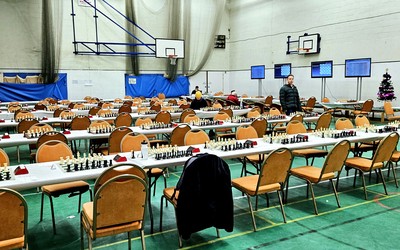
The Values By Which We Judge
How Personal Growth Can Aid Chess EnjoymentIt has been said (by someone somewhere) that how you play chess reflects your personality. If you are cautious, you may prefer slow prophylaxis over vicious attacks; if you are impulsive, you may move as such.
I know this to be true because I see it in my game; I am the latter above. Often these impulsive moves land me in hot water, both on and off the board. If you read my last blog about my experiences at the Hastings Congress weekend tournament, you will have seen how realising this and working on fixing it helped my game towards a solid tournament result. Since then, I have also taken that understanding and tried to apply it off the board, becoming a more considered person and honestly making better life decisions. So, if a lesson learned in chess can help in life, surely the vice-versa is true.
As with anything worthwhile, a place to start is the why. Why do I, why does anyone, do what I/they do? What is your motivation to do anything in the first place?
If you can work this out, maybe it is also the main driver behind your chess. Knowing this can help to redefine or change your motivation (if needed) and therefore improve your success. Improving your success has the added effect of improving your enjoyment. Let me be clear: by success, I do not mean rating or win rate. I mean how you define success based on the values that you deem important.
I have recently read 'The Subtle Art of Not Giving a F*ck' by Mark Manson. It is a brilliant book, insightful and funny, and I highly recommend it. Manson discusses our value judgements, the things that motivate us on the deepest level. He gives the example of Dave Mustaine, the founder, guitarist, and singer of the metal band Megadeth. He started this band with one goal in mind, a goal formed by his biggest value judgement: to be more successful than the band that previously fired him, who sent him packing on a bus home from New York to Los Angeles a few months before recording their debut album. Unfortunately for Mustaine, that band was Metallica.
Mustaine never achieved his goal. No matter how successful Megadeth became (they are a multi-platinum-selling artist, adored by fans across the world), they have never been more successful than Metallica. Therefore, Mustaine views his career, his life, as a failure, and has said so during interviews. Millions of other people would view Mustaine's success as something way beyond what they could ever achieve, but because his sole metric was to be more successful than the most successful metal band of all time, he failed.
This got me thinking. For many years I have suffered from severe depression, anxiety, and anger. There are many causes of this, and I have been working on it and got through a lot. Recently it has manifested as a general level of irritation with life. It has become clear that I do not see myself as successful based on the value judgments I have, so I have been unhappy. I didn't even know what these judgements were, or how important it was to understand them.
Chess has served as an escape, a way of having control over my environment, and as something that I can try to be good at. It has replaced many other things, such as music, art, photography, martial arts, and running my own businesses. It is important to me to be good at it, otherwise I wouldn't try.
Hang on. Stop. Am I really trying? My first post banged on about training and learning, resources, the correct way of doing things, and the mistakes I have made. Yet since then, I have still embarked on a-hundred-games-in-a-day bullet/blitz binges; stopped my training plan to study openings; withdrawn from club tournaments and 'solved' puzzles by finding out the answer; started YouTube channels only to delete them after 2 videos. So why am I doing it? What is the value judgement I hold in life that is also the reason I play chess?
I worked it out. My whole life I have wanted to be seen to be good at something. I will not go into all the details of this, suffice to say I realise I have been seeking validation through the acknowledgement of skill, from a specific person. I have judged my success on whether that person saw how good I was at something and complimented me on it. It could have been anything, it just now happens to be chess (and miniature painting). I don't try to improve because I don't care about the process of improvement, just the result. After all, that is what my 'success' is based on. It has been that way with everything I have tried to do. I see the irony that I probably started writing a blog this year for the same reason.
Just like Dave Mustaine, my level of ability and success in this or that thing may well be something others would admire. I do not, because I cannot gain the validation I crave. I can't ever get good enough at anything, not because I don't try to improve, but because no level of ability or achievement will gain it either.
How can this bit of knowledge, this personal growth, help my enjoyment of chess? It is simple really. It comes back to the sentiment of the Congress piece. Knowledge means I have the power to change. This value judgement does not serve me in any positive way, but I can now let this go, and establish a new value or set of values by which to live my life. I don't know what these are right now, but there is joy in knowing I have control over what they will be, a control I didn't have before - until I realised what has been motivating me.
For example, let's say I set the new value judgement of 'daily learning' - finding success in the act of learning something with no result associated. I could therefore enjoy chess (and anything else) by just learning about it. I don't need to win a game or a ton of rating to be happy under that value judgement. It may sound like a simplistic answer to a complex psychological issue, but in my experience that is often the way. It's like a magic trick: baffling until you see how simple it is. Maybe a better analogy is a tactic puzzle. How often have you not solved a puzzle, only to be shown the answer and exclaim 'Of course!'?
Personal growth, just like chess improvement, is a constant undertaking that requires practice. What I have presented here is an idea only, a theory based on my latest piece of reading and understanding, and I look forward to working on it and seeing how it may benefit me. I may think differently next week; I'll let you know. For now, I hope this blog has value to you, dear reader, and even makes you think about how it may apply to your own chess - and, perhaps, life.


